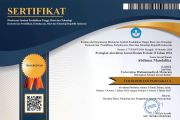Pengembangan Potensi Wisata: Penyuluhan Meningkatkan Ekonomi Masyarakat Berbasis Kearifan Lokal dan Hukum
Abstract
Abstract: This community service aims to develop tourism potential based on local wisdom that can enhance the economy of the community through counseling in Kadipaten Village, Wonosobo Regency. The method used is the Asset Based Approach (ABA), which emphasizes the utilization of existing local assets, such as traditions, culture, and natural resources, to create sustainable solutions in the tourism sector. The parties involved in this community service include local communities, the Kadipaten Village government, the Wonosobo Regency government, and the private sector, which form a partnership to plan and implement activities. The community is involved in every stage of development, starting from the identification of local assets, planning, to the implementation of local wisdom-based tourism activities. The results of community service show that by involving the community in tourism management, as well as providing education about the importance of protecting and preserving local culture, the local economy has improved through an increase in tourist visits and the empowerment of local economic potential.
Abstrak: Pengabdian masyarakat ini bertujuan untuk mengembangkan potensi wisata berbasis kearifan lokal yang dapat meningkatkan ekonomi masyarakat melalui penyuluhan di Desa Kadipaten, Kabupaten Wonosobo. Metode yang digunakan adalah Asset Based Approach (ABA), yang menitikberatkan pada pemanfaatan aset lokal yang ada, seperti tradisi, budaya, dan sumber daya alam, untuk menciptakan solusi berkelanjutan dalam sektor pariwisata. Pihak-pihak yang terlibat dalam pengabdian masyarakat ini meliputi masyarakat lokal, pemerintah Desa Kadipaten, pemerintah Kabupaten Wonosobo, dan sektor swasta yang membentuk kemitraan dalam merencanakan dan melaksanakan kegiatan. Masyarakat dilibatkan dalam setiap tahap pengembangan, mulai dari identifikasi aset lokal, perencanaan, hingga pelaksanaan kegiatan wisata berbasis kearifan lokal. Hasil pengabdian masyarakat menunjukkan bahwa dengan melibatkan komunitas dalam pengelolaan wisata, serta memberikan penyuluhan tentang pentingnya perlindungan dan pelestarian budaya lokal, ekonomi masyarakat meningkat melalui peningkatan kunjungan wisatawan dan pemberdayaan potensi ekonomi lokal.
Keywords
Full Text:
PDFReferences
Alamineh, G. A., Hussein, J. W., Endaweke, Y., & Taddesse, B. (2023). The local communities’ perceptions on the social impact of tourism and its implication for sustainable development in Amhara regional state. Heliyon, 9(6). https://doi.org/10.1016/j.heliyon.2023.e17088
Amin, G., & Rahmiati, F. (2021). How Community Based Influence Self Esteem In Rural Tourism Development. ICCD, 3(1), 40. https://doi.org/10.33068/iccd.vol3.iss1.345
Arief, & Nugroho. (2023). Legal Protection of Cultural Heritage in Village Tourism. https://doi.org/10.1017/S1744552323000123
Datta, R., & Kairy, B. (2024). Decolonizing Climate Change Adaptations from Indigenous Perspectives: Learning Reflections from Munda Indigenous Communities, Coastal Areas in Bangladesh. Sustainability, 16(2), 769. https://doi.org/10.3390/su16020769
Dwiatmojo, A. R., Indriani, N., Nyura, Y., George, F. M., & Kamarudin, K. H. bin. (2022). Preliminary Study on Rural Tourism Development in Kutai Kartanegara Regency, East Kalimantan: Potential and Status. Advances in Social Science, Education and Humanities Research. https://doi.org/10.2991/assehr.k.220301.040
Fuchs, G., & Bittner-Fesseler, A. (2023). CSR and Sustainability communication.
García-Rosell et al. (2022). Community-Based Tourism Awareness Programs. https://doi.org/10.1080/13683500.2022.2056067
Ginanjar, R. (2023). Community Empowerment In Tourism Development: Concepts And Implications. The Eastasouth Management and Business, 1(3), 111. https://doi.org/10.58812/esmb.v1i03.82
Hariyadi, B. R., Rokhman, A., Rosyadi, S., Yamin, M., & Runtiko, A. G. (2024). The Role of Community-Based Tourism in Sustainable Tourism Village In Indonesia. Revista de Gestão Social e Ambiental, 18(7). https://doi.org/10.24857/rgsa.v18n7-038
Head, B. (2007). Community Engagement: Participation on Whose Terms? Australian Journal of Political Science, 42(3), 441. https://doi.org/10.1080/10361140701513570
Irianto, A. (2018). Model-Model Pengembangan Atraksi Wisata Wonosobo. Nusa Jurnal Ilmu Bahasa dan Sastra, 13(1), 167. https://doi.org/10.14710/nusa.13.1.167-179
Kretzmann & McKnight. (2020). Sustainable Community Development through Asset-Based Approaches. https://doi.org/10.1017/S004884020005678
Millner, N., Peñagaricano, I., Fernandez, M., & Snook, L. K. (2019). The politics of participation: Negotiating relationships through community forestry in the Maya Biosphere Reserve, Guatemala. World Development, 127, 104743. https://doi.org/10.1016/j.worlddev.2019.104743
Nurhayati & Darmawan. (2022). Empowerment and Local Capacity Building: Lessons from Rural Tasikmalaya. https://doi.org/10.1080/12345678.2022.987654
Nurmayani, N., Deviani, E., Mahdewi, R., & Banjarani, D. R. (2021). Penerapan Konsep Pembangunan Berkelanjutan Dalam Hukum Lingkungan Indonesia.
Papallou, E., Katafygiotou, M., & Dimopoulos, T. (2024). Emerging Sustainability Trends in Tourist Facilities: A Comparative Assessment of Multiple Hotels and Resorts. Sustainability, 16(9), 3536. https://doi.org/10.3390/su16093536
Purnomo, S., Rahayu, E. S., Riani, A. L., Suminah, S., & Udin, U. (2020). Empowerment Model for Sustainable Tourism Village in an Emerging Country. Journal of Asian Finance Economics and Business, 7(2), 261. https://doi.org/10.13106/jafeb.2020.vol7.no2.261
Rianto et al. (2021). Capacity Building for Village Officials in Tourism Governance. https://doi.org/10.1177/109634802110345
Rustini, N. K. A., Budhi, M. K. S., Setyari, N. P. W., & Setiawina, N. D. (2022). Development of Sustainable Tourism Based on Local Community Participation. Journal of Economics Finance and Management Studies, 5(11). https://doi.org/10.47191/jefms/v5-i11-16
Setiadi, H., & Widodo, W. (2024). Unveiling the effect of proactive work behavior on task performance through boundary-spanning leadership and psychological empowerment. Problems and Perspectives in Management, 22(3), 556. https://doi.org/10.21511/ppm.22(3).2024.42
Sulaiman, A. I., Chusmeru, Adi, T. N., & Runtiko, A. G. (2021). Community Socio-Economic Empowerment In Tourist Village Development. International Journal of Education and Social Science Research, 4(3), 238. https://doi.org/10.37500/ijessr.2021.4314
Sutresna, I. B. M., Suyana, U. I. M., Saskara, I. A. N., & Wiwin, S. N. P. (2019). Community Based Tourism As Sustainable Tourism Support. *Russian Journal of Agricultural and Socio-Economic Sciences, 94*(10), 70. https://doi.org/10.18551/rjoas.2019-10.09
Wibowo, A., Muhammad, D. R. A., Lestari, E., & Karsidi, R. (2021). Development of a Language Tourism Village Based on Environmental Ethics and Social Entrepreneurship (A Case Study in Karanganyar Regency, Central Java, Indonesia). E3S Web of Conferences, 317, 2015. https://doi.org/10.1051/e3sconf/202131702015
Widagdo, Y. M. (2022). Potential Feasibility of Menggung Coffee as A Product of Local Wisdom in Sewu Kembang Tourism Village Nglurah Tawangmangu. Tourism and Sustainable Development Review, 3(2), 74. https://doi.org/10.31098/tsdr.v3i2.72
Yunikawati, N. A., Istiqomah, N., Priambodo, M. P., Puspasari, E. Y., Sidi, F., & Marzanah, A. (2021). Community Based Rural Tourism (CBRT): The Impact on Local Residents Quality of Life in Indonesia. E3S Web of Conferences, 228, 2012. https://doi.org/10.1051/e3sconf/202122802012
DOI: https://doi.org/10.31764/am.v4i3.30200
Refbacks
- There are currently no refbacks.
EDITORIAL OFFICE :













